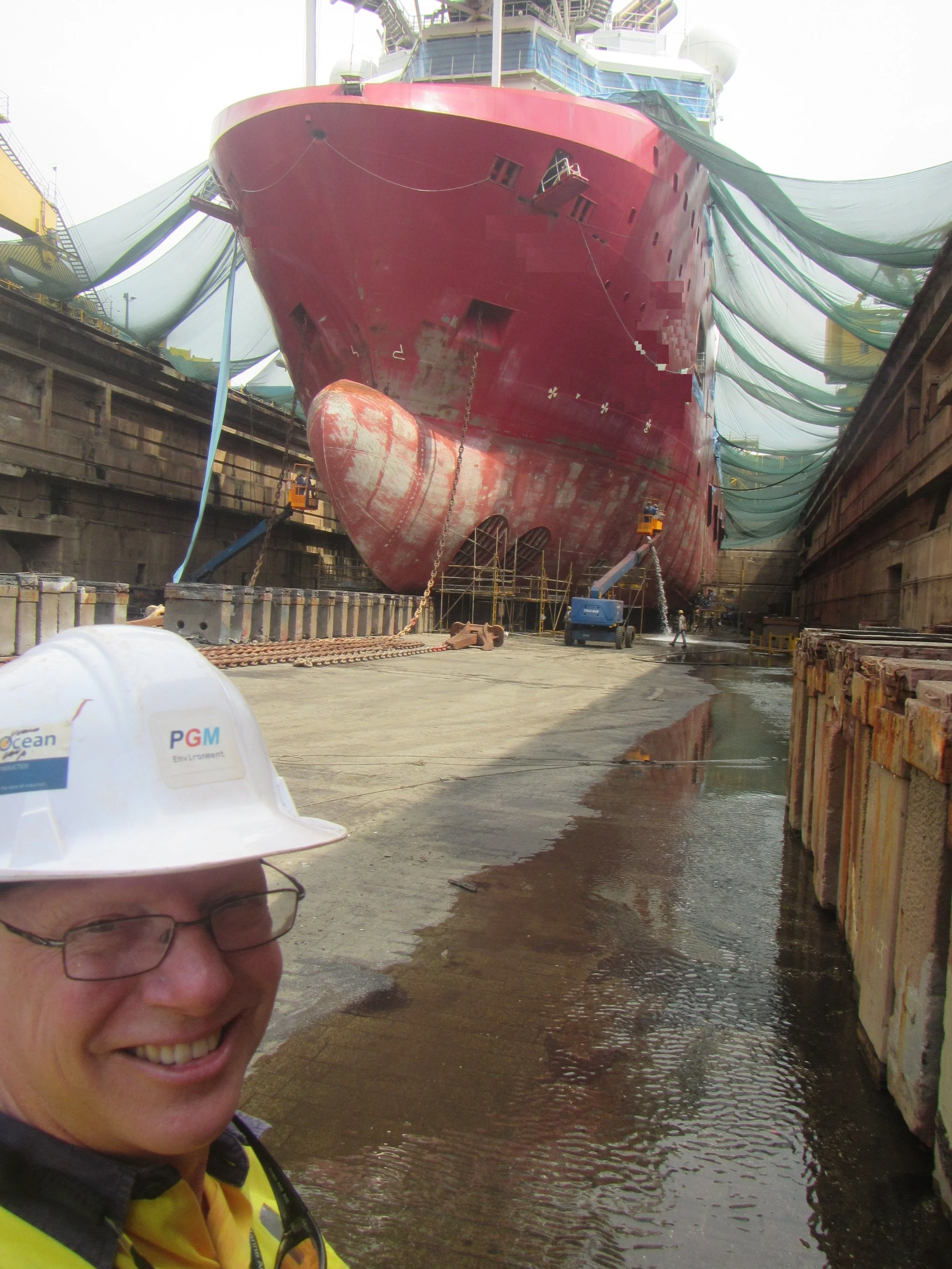Since its formation in 2009, PGM Environment has established a worldwide reputation as a source of informed, pragmatic and sensible marine environmental management advice and risk analysis.
Our focus
PGM’s focus is always on working with maritime operators and agencies ‘to get on with their job,’ helping them to responsibly manage their environmental risks and obligations.
Proven Record
PGM has a proven record of mobilising globally, often at short notice, and has undertaken work on every permanently inhabited continent.
500 Ship Biofouling Inspections / Assessments completed Q2 2019
Client Base
PGM Environment’s client base includes ship owners and operators, port authorities, ship designers, maritime regulatory and policy setting agencies, defence industries, and many other companies involved in maritime services, coastal and marine infrastructure and development. These include some of the world’s pre-eminent maritime service providers, including those engaged in activities such as dredging, pipe laying and offshore petroleum exploration and development.
PGM Project Locations. Visited in Red. Worked on project remotely in Blue.
John Polglaze
The principal of PGM Environment is John Polglaze FIMarEST FRINA CMarSci.
John is recognised internationally for his work on the environmental assessment and management of ship designs and operations, port developments and operations and related matters such as marine anthropogenic noise. He has spoken on this latter subject, by invitation, in Australia, the United States, Italy, Denmark, Ireland, Latvia and the Netherlands, and is a regular invitee to NATO seminars on this subject.
Areas in which John Polglaze has particular expertise also include ship disposal and sea dumping, ship waste management, and vessel biofouling management. He was project manager for the biofouling survey for a major Australian maritime organisation, in a two-year program involving over 40 drydock and in-water dive inspections of multiple types of ships, boats and specialist vessels, ranging from 250t to 42,000t displacement. This survey led to work to develop biofouling management policy and procedures at the national and international levels. This work underpins the deep understanding that PGM Environment has regarding biofouling patterns on ships and inherent ship biofouling vulnerabilities. John chaired the biofouling session of the IMO sponsored 1st International Ballast Water Risk Assessment Workshop.
John founded PGM Environment after 10 years with a major multi-national engineering and environmental services company. He has over 35 years’ of maritime experience, having initially developed his maritime knowledge serving in the Royal Australian Navy for 19 years in submarines and surface ships. He is a qualified Submariner.
John also has experience working as a commercial diver.
John’s Memberships
Fellow of the Institute of Marine Engineering, Science and Technology (FIMarEST) indicating skill, knowledge and experience, but also a sustained dedication to the advancement of the maritime industry.
Fellow of the Royal Institution of Naval Architects (FRINA), having achieved professional standing in the maritime community, and having held positions of superior responsibility in the maritime industry for a period of at least five years.
Chartered Marine Scientist (CMarSci), having demonstrated at least five years of competence and with ongoing professional development, to the satisfaction of the UK Science Council, in harnessing, exploiting, managing, using or applying marine science in the pursuit of knowledge, understanding of the marine environment, wealth creation and/or the provision of services in the marine sector.
Registered Environmental Auditor in the field of Environmental Management Systems, including environmental compliance.
Member, Environmental Institute of Australia and New Zealand (MEIANZ).
Full Member, Environmental Consultants Association of Australia (WA Branch).
Member, World Association for Waterborne Transport Infrastructure (PIANC).
John’s Qualifications
Master of Environmental Management and Development (1997), Australian National University
Graduate Certificate in Marine Sciences (2013), University of Tasmania
BSc (Honours I) Environmental Science (1995), Murdoch University, with Vice-Chancellor’s Commendation for Academic Excellence
Diploma in Naval Architecture (2020), Lloyd’s Maritime Academy, with Commendation
Graduate Certificate in Administration (1998), Royal Australian Navy
Selected Publications
Polglaze, J.F. (2018). Instead of Simply Asking ‘What?’, Naval Engineers Need to Ask ‘Why?’: Environmental Compliance Challenges and Relevance in Warship Design. In Conference Proceedings of INEC 2 – 4 October 2018.
Hockings, M., Leverington, A. Trinder, C., Polglaze, J. (2014). Independent Assessment of Management Effectiveness for the Great Barrier Reef Outlook Report 2014. Great Barrier Reef Marine Park Authority, Townsville.
Polglaze, J.F. (2012). Great Barrier Reef Shipping: Review of Environmental Implications. Report prepared for Abbot Point Working Group / BHP Billiton by PGM Environment.
Polglaze, J.F. (2012). “So, Am I Correct in My Understanding That a Decibel Is the Same as a Hertz?”: The Quest for Informed, Objective Environmental Impact Analysis of Marine Anthropogenic Noise. In A.N. Popper and A. Hawkins (eds.), The Effects of Noise on Aquatic Life, pp. 515-517.
Alexandrov, B, Bashtannyy, R., Clarke, C., Hayes, T., Hilliard, R., Polglaze, J., Rabotnyov, V. & Raaymakers, S. (2004). Ballast Water Risk Assessment, Port of Odessa, Ukraine, October 2003: Final Report. GloBallast Monograph Series No. 10. IMO London.
Anil, A.C., Clarke, C., Hayes, T., Hilliard, R., Joshi, G., Krishnamurthy, V., Polglaze, J., Sawant S.S. & Raaymakers, S. (2004). Ballast Water Risk Assessment, Ports of Mumbai and Jawaharlal Nehru, India, October 2003: Final Report. GloBallast Monograph Series No. 11. IMO London.




